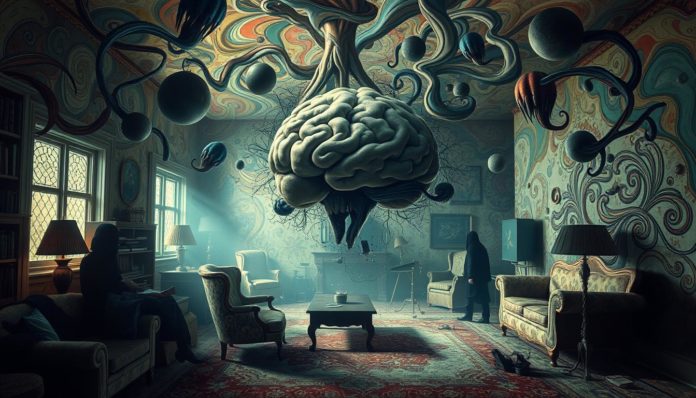Did you know nearly 20% of people with dementia face psychosis? Yet, up to 60% of these cases go untreated. It’s key to know how important it is to tackle the risks of dementia psychosis. This helps keep the mental health of the elderly in good shape. It also stops dementia from getting worse quickly.
A 2020 study by Cummings and others highlighted something critical. They pointed out how essential it is to notice and treat dementia-related psychosis. This step can stop serious problems. These problems include a drop in life quality and more work for caregivers. During the COVID-19 pandemic, a worrying trend emerged. More dementia patients started getting antipsychotic drugs. This situation stresses the need for cautious and minimal use of these drugs. Overuse might lead to serious side effects like stroke and heart attacks.
Understanding the wide-reaching effects of not treating dementia-related psychosis is crucial. We need to see how big this issue is. Also, we must take steps to protect the cognitive health and happiness of those affected.
Understanding Dementia-Related Psychosis
Understanding dementia-related psychosis helps in caring for those with this complex condition. Hallucinations and delusions are common problems they face. These issues can cause difficult behavior and psychological challenges.

What is Dementia-Related Psychosis?
People with dementia may see or believe things that aren’t real. This is called dementia-related psychosis. It can make existing cognitive problems worse.
Common Symptoms Associated with Dementia Psychosis
The common dementia psychosis symptoms include:
- Visual and auditory hallucinations
- Paranoid delusions
- Agitated and aggressive behavior
- Significant changes in mood and personality
These symptoms disrupt daily life for patients. It’s crucial for caregivers to address these issues quickly.
Differences Between Dementia and Other Cognitive Declines
Dementia and other cognitive declines are different. Dementia leads to a severe drop in mental function.
Other declines can be more gradual or linked to specific causes. Knowing these differences helps in managing dementia psychosis.
Risks of Untreated Dementia-Related Psychosis
Untreated dementia-related psychosis affects more than just the patient. It sends waves of impact through many areas of life. The consequences are deep, touching both the patient’s mind and the caregiver’s well-being.

Impact on Patients’ Quality of Life
Without treatment, the quality of life for dementia patients drops sharply. Hallucinations and delusions make simple tasks hard and scary. This struggle increases anxiety, stress, and depression. Thus, patients find less joy in life. The impact is huge and affects many.
Potential for Accelerated Cognitive Decline
Untreated psychosis can make dementia get worse faster. Patients not getting help face quicker cognitive loss. This speeds up their move to advanced dementia stages. Research backs up this worrying trend.
Increased Caregiver Burden
Caregivers also feel the strain of untreated psychosis. Dealing with a loved one’s delusions and erratic behaviors is hard on them. It leads to caregiver burnout and hurts their health. The constant need for supervision wears them down. Treating psychosis is key for easing this burden.
| Aspect | Consequences |
|---|---|
| Quality of Life Impact | Increased anxiety, stress, and depression; reduced ability to enjoy daily activities. |
| Dementia Cognitive Decline | Accelerated decline in cognitive functions, faster transition to severe stages of dementia. |
| Caregiver Burden | Increased emotional and physical strain, leading to caregiver burnout and decreased health. |
Recognizing Early Signs of Psychosis in Dementia
Spotting psychosis in dementia early is key to managing it well. This can slow the disease and make life better for both patients and their caregivers. Watching for symptoms closely really helps.
Hallucinations and Delusions
Hallucinations and delusions are early psychosis signs in dementia. Patients might see or hear things that aren’t there. This can make them scared and confused. Spotting these signs early is crucial for the right treatment.
Behavioral Changes
Early dementia behavioral changes can be increased irritability, aggression, or pulling away socially. These changes are worrying for both the person and their caregivers. Watching these changes and getting expert advice is important for handling these signs well.
Dementia Symptoms: When to Seek Help
Recognizing dementia symptoms early can significantly improve life quality and slow down the condition. Knowing when to seek help for dementia is crucial. An early medical consultation for dementia can relieve symptoms and set up a strong care plan.
Identifying the Threshold for Medical Consultation
It’s time for a medical consultation for dementia when symptoms like memory loss, confusion, or behavior changes appear. These may show as forgetting dates, struggling with usual tasks, or speech problems. Getting help fast means the affected person gets the right support early on.
Role of Caregivers in Early Detection
Caregivers in dementia detection play a key role. They’re often the first to spot the early signs needing a closer look. Caregivers must watch carefully and act fast upon noticing any symptoms that suggest a doctor’s visit. Their quick action can lead to faster diagnosis and care.
| Sign | Description |
|---|---|
| Memory Loss | Frequently forgetting recent events or information |
| Confusion | Getting disoriented with time and place |
| Behavioral Changes | Uncharacteristic mood swings or personality shifts |
Dangers of Ignoring Dementia-Related Psychosis
Ignoring signs of dementia-related psychosis can have serious, lasting effects. Not noticing early signs worsens the patient’s state and burdens caregivers and healthcare. Psychosis in dementia includes agitation, seeing things, false beliefs, and mood swings.
The dangers of ignoring dementia psychosis are big and complex. If not checked, symptoms lead to worse brain function. This makes daily tasks very hard. Families and caregivers face more stress and emotional pain. Also, untreated symptoms increase risks of health problems like stroke and heart attacks.
It’s key to know these symptoms can be handled with the right care. As shown in a study, early action can improve lives. It helps patients and their caregivers have a better quality of life.
Not treating dementia-related psychosis affects mental health too. Patients may become more aggressive, pull away from others, and feel very alone. It’s crucial to have good ways to deal with these risks. This helps make life better for those with dementia.
Different treatments and therapy are important to handle these issues. Not paying attention to symptoms leads to bad outcomes. But, with the right care, many problems can be avoided.
Cognitive Decline in Dementia: Preventive Measures
Dementia progresses over time, but we can slow it down. Creating a supportive setting and doing activities for brain health helps. Let’s explore ways to fight cognitive decline together.
Creating a Supportive Environment
A supportive dementia care environment matters a lot. It means making home safe and welcoming. Labeling clearly, ensuring good lighting, and adding familiar items make big changes. These actions make patients feel secure and valued, boosting their mood and health.
Engaging in Cognitive Stimulation Activities
Cognitive stimulation for dementia is crucial. It involves puzzles, memory games, and chats to activate the mind. Studies show these activities boost memory and problem-solving skills. They form a helpful routine for those with dementia.
Monitoring for Changes in Behavior
It’s vital to watch for changes in behavior. Seeing mood, routine, or skill changes early can signal the need for a doctor’s help. Being alert and ready to act is important in combating dementia’s progress.
Using these steps gives a full plan for fighting dementia. It aims to give patients the highest quality of life possible.
Effective Dementia Treatment Options
A whole-person approach is vital in managing dementia. It includes both drug and non-drug methods. This helps those affected by dementia and their caregivers tackle the condition’s challenges.
Medications and Their Efficacy
Medication is a key part of treating dementia. Options range from cholinesterase inhibitors like Donepezil to memantine. These aim to ease symptoms and slow mental decline. It’s important to see how well these medications work. This helps customize treatment for each person’s needs. Studies show these drugs help, but their success varies. It depends on the dementia stage and the patient’s overall health.
Non-Pharmacological Interventions
There’s great value in treatments beyond medication for dementia. Activities like cognitive therapy, physical exercise, and creating a supportive setting can really help. Research highlights the big impact of engaging in stimulating activities on life quality. It’s also essential to understand therapy’s role in meeting emotional and psychological needs, alongside cognitive ones.
| Dementia Treatment Options | Pros | Cons |
|---|---|---|
| Medications | Symptom relief, slows progression | Variable efficacy, potential side effects |
| Non-Pharmacological Interventions | Improves quality of life, holistic | Requires ongoing engagement, individualized |
Combining drug and non-drug treatments usually works best for dementia. Understanding all available options allows for better navigation through this challenging condition. It empowers patients and caregivers on their journey through dementia.
Managing Dementia Hallucinations and Delusions
It is key to work together. This includes caregivers and doctors when dealing with dementia symptoms like hallucinations and delusions. Understanding these signs is essential. By doing so, we can offer better care and improve the life of those affected.
Strategies for Caregivers
Caregivers are crucial in helping manage dementia symptoms. A calm and supportive approach is important. Also, acknowledging the patient’s feelings helps lessen their distress. Making a comfortable and familiar setting can also ease confusion and worry. Activities like music or recalling past events can shift focus from upsetting symptoms.
Professional Medical Treatments
Doctors may prescribe antipsychotic meds for dementia psychosis. Yet, consulting healthcare providers is vital to discuss the pros and cons. Research, such as the one on the National Center for Biotechnology Information, suggests combining drug and non-drug methods. This mix often leads to the best results. Keeping a close watch and tailoring care plans are key to managing these challenging symptoms effectively.
Teamwork between caregivers and health pros is essential. Merging caregiving approaches with medical treatments can greatly improve the patient’s well-being. Addressing these symptoms not only betters the patient’s life. It also eases the load on caregivers.
FAQ
What is Dementia-Related Psychosis?
Dementia-Related Psychosis involves hallucinations and delusions within dementia’s range. These symptoms change behavior significantly. They also affect how people perceive things and think.
What are the common symptoms associated with dementia psychosis?
It includes hallucinations and delusions. There are also big changes in behavior and how a person thinks and sees the world. These can greatly affect someone’s life and speed up dementia.
How does dementia-related psychosis differ from other cognitive declines?
Unlike other declines, it comes with hallucinations and delusions. This makes it different from other cognitive issues without these symptoms.
What is the impact of untreated dementia-related psychosis on patients’ quality of life?
Not treating it can lower life quality a lot. It leads to worse behaviors, more anxiety, and quick cognitive drops. This also increases death risk from severe psychosis complications.
Can untreated dementia-related psychosis accelerate cognitive decline?
Yes, it can make cognitive decline happen faster. That’s why spotting and treating these symptoms early is very important. It prevents mental function from getting worse quickly.
How does dementia-related psychosis increase the burden on caregivers?
Caregivers find it tough because symptoms like hallucinations ask for more care. This can make them stressed, tired, and in need of better care skills.
How can hallucinations and delusions signal early psychosis in dementia?
These symptoms often show up early in dementia psychosis. Early spotting can lead to better disease control. It could slow down the mind’s decline.
What behavioral changes indicate early signs of psychosis in dementia?
Sudden behavior changes, like getting quickly upset or pulling away from others, can warn of early psychosis. Quick action can manage dementia better.
When should you seek medical consultation for dementia symptoms?
Seek help when signs like memory issues, confusion, seeing things, or big behavior shifts pop up. Getting advice early helps control and treat it better.
What role do caregivers play in the early detection of dementia?
They’re crucial for spotting dementia early as they see changes first. Their notices lead to quicker doctor visits and help.
What are the dangers of ignoring dementia-related psychosis?
Overlooking it can cause big problems like swift mind decline and higher stroke or heart attack risk. Quick action lowers these dangers.
What preventive measures can be taken for cognitive decline in dementia?
Steps include a helpful setting, doing mind exercises like puzzles, and watching for behavior changes. This helps tweak care right away.
What medications are effective for treating dementia-related psychosis?
Antipsychotics can help with severe signs, but be careful because of side effects. Always talk to health pros for the best course.
What are some non-pharmacological interventions for dementia treatment?
Treatments without drugs involve therapy, changing the setting, staying social, moving more, and therapies that involve the senses. They support medical care for all-around wellbeing.
How can caregivers manage hallucinations and delusions in dementia patients?
By keeping things calm, speaking kindly, understanding their feelings without supporting false beliefs, and getting medical advice for treatments.
What professional medical treatments are available for managing dementia hallucinations and delusions?
Treatments include antipsychotic meds, care plans made just for one, and whole-person approaches with therapy. Get help from health experts for these.


